Beverly Gray's Blog: Beverly in Movieland, page 16
April 4, 2024
Helen Mirren Slams The Door Shut
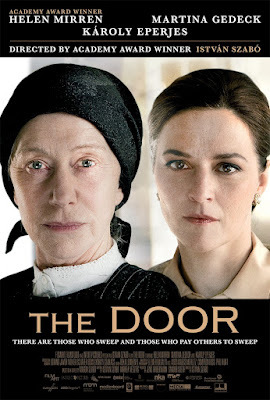
Mywomen’s book group has recently been bypassing American pop novels (see, forinstance, the enjoyable but thin Lessons in Chemistry) to focus oncomplex works by female authors like Maylis de Kerangal (from France) and JennyErpenbeck (from Germany). Of course we’re reading in translation, but the worksof these women open up to us worlds we may never before have contemplated. Iwas particularly taken by Erpenbeck’s Visitation, an eerie recap ofrecent history, as seen from the perspective of a luxurious lakeside house deepin the German countryside. I had never previously heard of Erpenbeck, who’sconsidered a prime candidate for the Nobel Prize for literature. No question:her canon is worth exploring.
Thispast month, the book on our reading list was The Door, a newlytranslated 1987 short novel by veteran Hungarian author Magda Szabó. Thenarrator, a middle-aged Hungarian author much like Szabó herself, has moved toa small town, where she and her husband teach and pursue literary goals. Inneed of housekeeping help, the narrator approaches Emerence, an ageing womanwho has accepted household chores for a numberof neighbors, while also taking upon herself the thankless drudgery of sweepingsnowy sidewalks with a broom. It’s soon crystal-clear that Emerence has a mindof her own, accepting only those clients who suit her and being quick to voiceopinions (usually negative ones) about the neighbors’ life choices at everyturn.
Ibring all this up because in 2012 the internationally acclaimed novel was madeinto a film which I recently watched, just after reading the novel on which itwas based. Though the director, the screenwriters, and the vast majority ofcast members are Hungarian, the film was shot in English. Partly this was (Iassume) to facilitate international distribution; partly it was also a way ofaccommodating its star, the formidable Helen Mirren. Mirren, whose father wasRussian-born, seems to have a real affinity for eastern European roles (seesuch films as White Nights and The Last Station, in which sheplays the wife of the ailing author Tolstoy). And surely it takes someone withMirren’s charisma to hold down the role of a woman who is proudlycantankerous, as well asanti-intellectual and anti-social. The crux of the film is her give-and-takerelationship with the narrator-figure, named Magda after the novel’s author.Magda, over the years, comes to appreciate the generosity behind Emerence’stough exterior. She sees how much of herself Emerence gives to those in need,and appreciates in particular Emerence’s almost mystic bond with animals.Still, she can’t easily swallow Emerence’s unrelenting sense of her ownrightness on every issue. She can’t bear dealing with a woman incapable ofseeing herself in the wrong. Gradually, Magda comes to understand Emmerence’sinflexibility better and is able to see her forbidding nature as evolving outof the slings and errors of the history she’s endured. Still, the relationshipremains a troubled one, even unto death.
Thefilm version of The Door strips out some major plot details from thenovel. And the key moment when Magda feels impelled to force open the door toan ailing Emerence’s flat doesn’t linger in the mind the way it does when weread about it. By way of compensation, the film makes many of the circumstancesof Emerence’s past more compelling, especially those presented through vividflashbacks. There’s also a small but key change at the film’s conclusion—thearrival of a long-sought visitor—that leaves us with poignancy but not anguish.The film’s worth recommending, though it’s not an easy journey.
A one-day-early salute to my former boss and biography subject, the ageless Roger Corman, on his 98th birthday.
April 2, 2024
Remembering the Revenge of the Nerds

The Urban Dictionary definesa nerd as someone whose IQ exceeds his weight. Note the gender implied by thepronoun “his”: the assumption here is that nerds are males, though wimpy ones.They’re smart, particularly in the so-called STEM fields, but not sociallyadept, and hardly of much interest to the opposite sex. For a recent example,see Sheldon (played to a T by Jim Parsons), the awkward young physicist on thetwelve seasons of TV’s The Big Bang Theory. But do note he eventuallymanaged to find true love with a female of the species, neuroscientist AmyFarrah Fowler (Mayim Bialik).
In 1984 the term “nerd” wasin only limited use. But Hollywood studios had recently enjoyed major successwith such rowdy campus comedies as Animal House(1978) and Porky’s(1981). And Twentieth Century-Fox, flush with cash from its Star Warsfranchise, decided it could gamble on a tax write-off with the low-budget Revengeof the Nerds. This sweetly raunchy romp, which pulled in a nice chunk ofchange for Fox, makes its beleaguered nerds into campus heroes. That’s not howthey start out, however. Lewis (Robert Carradine) and Gilbert (Anthony Edwards)are thrilled to be matriculating at Adams College, supposedly the bestcomputer-science school in the nation. This is hardly Caltech, though, wherebig-time sports and female students remain almost non-existent. Adams College(played in the film by the University of Arizona) is pretty much run by itsrah-rah football coach (John Goodman in an early role). And the campus isswarming with jocks and sexy coeds, all of them affiliated with Greek houses.Because of careless, nasty pranks pulled by frat boys, incoming freshmen likeLewis and Gilbert lose their campus housing and must sleep on cots in the gym.For self-preservation they band together with other frosh nerds (like afrizzy-haired violinist, an innocent from Japan, a stylish gay guy, and a boygenius) to form a fraternity of their own.
The nerds end up shaking offthe schemes of the jocks and using their own offbeat smarts to win the GreekGames and carnival. No one in this film ever seems to do something as mundaneas attending classes. Education comes by way of social interaction, even withgirls. Though the nerds do connect with a campus sorority made up of awkwardand unattractive female outcasts, their biggest pleasure comes fromelectronically bugging the Pi Delta Pi house, then watching over video as itscuties casually disrobe. (One later exclaims, in horror, “A nerd saw menaked!”) At least one nerd later puts his knowledge to good use, provinghimself to be a surprising stud with the most bodacious young woman on campus,who happily gives up her handsome blond quarterback boyfriend for him. Sothere!
Most of the tricks played bythe nerds on their tormentors are funny rather than disgusting, though they doresort to dousing the jocks’ jockstraps with liquid heat. By the time theystage a razzle-dazzle musical show for the student body (complete withfireworks, rock violin, electronic effects, and breakdancing), we’re firmly ontheir side, and glad to respond to the campus cry that “We are allnerds!” while Queen’s “We are the champions” blasts out on the soundtrack
The DVD I watched included a jubilant reunionof most of the cast, including star Robert Carradine (who in real life respondsfar more to race cars than computers). The two biggest names in the production,John Goodman and James (back then Jamie) Cromwell, didn’t show for thetaping. But I suspect a good time on setwas had by all.
March 29, 2024
“Airplane!”: Don’t Call Them Shirley
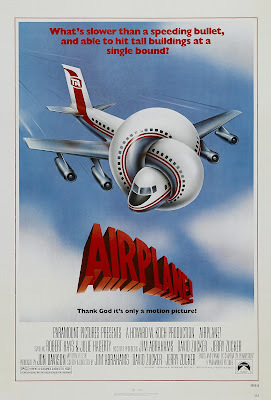 When I was a young married,there arose (just a stone’s throw from 20th Century Fox Studios)something called Kentucky Fried Theatre. The invention of three antic young menfrom the University of Wisconsin-Madison, the theatre housed a popular sketchcomedy show called My Nose. This oddball title allowed the trio to placeads in the Los Angeles Times announcing, “My Nose Runs Continually.” Anambitious fellow named Lorne Michaels once showed up in the audience with anNBC honcho, Dick Ebersol, whom he was trying to interest in the prospect of anetwork comedy series. Ebersol was convinced, and the result was (ta da!) SaturdayNight Live.
When I was a young married,there arose (just a stone’s throw from 20th Century Fox Studios)something called Kentucky Fried Theatre. The invention of three antic young menfrom the University of Wisconsin-Madison, the theatre housed a popular sketchcomedy show called My Nose. This oddball title allowed the trio to placeads in the Los Angeles Times announcing, “My Nose Runs Continually.” Anambitious fellow named Lorne Michaels once showed up in the audience with anNBC honcho, Dick Ebersol, whom he was trying to interest in the prospect of anetwork comedy series. Ebersol was convinced, and the result was (ta da!) SaturdayNight Live. Meanwhile the three KentuckyFried Theatre cut-ups moved from the live stage into movies. They soon struckcomic gold with their 1980 release, Airplane! By this point, JimAbrahams and brothers David and Jerry Zucker were no longer starring in theirown material (playing onstage such goofy roles as a strip-teasing Mister Rogers,who removes his jacket and shoes but doesn’t stop there). Instead the artisticménage à trois was responsible for both writing and directing a $3.5 million moviethat took in a reported $171 million worldwide, and was inducted into theNational Film Registry in 2010 for its cultural and aesthetic significance.
These three madcapwriter/directors have just come out with a behind-the-scenes memoir, “SurelyYou Can’t Be Serious”: The True Story of Airplane. It was mypleasure to hear David Zucker speak in person about how the film came to be.This was the era of all-star disaster movies like Airport (a crisis inthe air!), The Poseidon Adventure (acrisis at sea!), and The Towering Inferno (a crisis in a bigbuilding!) Arthur Hailey, whose novel begatthe film Airport had earlier contributed to the screenplay of a 1957thriller called Zero Hour! Its hero is a disgraced World War II flyerwho—while a passenger on a long-distance flight—must unexpectedly take over thecockpit of a large jetliner when passengers and crew are felled by foodpoisoning. Sound familiar? Yes, this basic plot shows up in extremis in Airplane!,with the addition of some outrageous sight gags, some deliberately corny jokes,and a blow-up autopilot named Otto.
When Zucker and company wentto cast their movie, they took the matter seriously in all senses. They had nodesire to follow in the footsteps of funnyman Mel Brooks, who stocked his castswith outsized performers like Dom DeLuise. Instead they looked for the sorts ofstraight-arrow actors who would have starred in serious B-movie action dramaslike Zero Hour! That film had featured Dana Andrews and Sterling Hayden.In Airplane! Zucker Abrahams Zucker (informally known as ZAZ) showcasedthe work of Leslie Nielsen, Peter Graves, and Robert Stack, none of whom had areputation for zany comedy. For their leading lady, the stewardess whose heartRobert Hays is trying to win back, they found Julie Hagerty. It was her veryfirst movie role, and her wide-eyed innocence fit in nicely with the insanitygoing on all around her. (Zucker discloses that another candidate for the rolewas Sigourney Weaver, who came to her audition in full 1940s stewardess garb,and then started making demands for script changes.)
Why was basketball starKareem Abdul-Jabbar cast as First Officer Roger Murdock? Because this was anera when sports stars were being shoe-horned into cameo roles in major movies. ZeroHour! in fact used as one of its pilots a famous retired footballer, Elroy“Crazylegs” Hirsch. Surely Kareem wore his wings well. But don’t call himShirley.
March 25, 2024
The Making (and Mocking) of a President: "Dave"
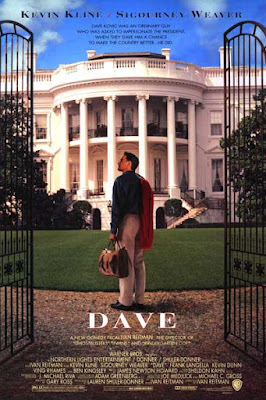
In this country, we’re fastapproaching the every-four-years Silly Season, when candidates go to insaneextremes to convince voters not to support their opponents. (Given the natureof the 2024 U.S. presidential candidates and their proxies, insanity is trulythe name of the game.) Last evening, I decided to turn away from politicalrealities by watching a 1993 film that finds great humor and heart in a presidential what-if.
In Dave, which cameout in the year of Schindler’s List, Kevin Kline plays U.S. PresidentBill Mitchell, a cold-hearted man withan eye for pretty young bed-warmers. It bothers him not one whit that hisbehavior has permanently estranged the First Lady (Sigourney Weaver), who onlypretends to be part of a happy presidential couple. But his misbehavior catchesup with him when, in bed with a cute member of his staff, he suffers a severestroke. His cagey chief of staff (the always-slightly-reptilian Frank Langella)has no wish to undermine his own power by handing the reins of government overto the squeaky-clean vice-president (Ben Kingsley, of all people).l Hissolution is to elevate a convenient look-alike (also, of course, played byKevin Kline) into the presidency. Kline’s Dave, who runs a Georgetown tempagency, is naturally at first awed by the honor of pretending to be PresidentMitchell. He’s naïve about the personalities of the powers that be, andoverwhelmed by the thrill of actually occupying the presidential suite in theWhite House. (When he lifts up a phone receiver to make a call from the OvalOffice, he feels the need to ask if he needs to dial 9 first.)
But Dave, for all hisaw-shucks manner, is not exactly a fool. He believes in his country’s mission,sees true honor in helping the genuinely needy, and quickly discovers that asPresident Mitchell he’s positioned to do an end-run around his malevolent chiefof staff. There comes a time, though, when the situation of a missing,ailing president has to be permanentlyresolved. And Dave’s inventive solution, which I’m sure takes most viewerscompletely by surprise, allows for a happy ending that’s at least semi-credible,given all that’s gone before.
It's well known that comedies,even excellent ones, are generally overlooked when Oscars are handed out. Theyear of Schindler’s List also produced a number of other seriously greatfilms, like The Remains of the Day, The Age of Innocence, and Philadelphia,the AIDS-related drama for which Tom Hanks won his first Oscar. Dave was nominated for exactly one AcademyAward, a well-deserved nod to Gary Ross for his original screenplay, whichbeautifully sets up all the craziness to come. (As a longtime teacher ofscreenwriting. I salute him.) The screenwriting Oscar, though, went to JaneCampion, for her extraordinarily inventive work on The Piano. (Otherlosers in that category were Ron Nyswaner for writing Philadelphia andNora Ephron—among others—for scripting a romcom classic, Sleepless inSeattle.)
Politics American-style is afunny business. The year of Dave’s release into theatres was also theyear that William Jefferson Clinton entered the White House. When the threat ofa presidential impeachment arose in Dave, audiences of the time werewell aware that a U.S. president had never been impeached since Andrew Johsonin 1868. That was to change in 1998 following the notorious Monica Lewinskyaffair, and of course we all know what president was impeached twice during hissingle term in office.
What’s going on our countrytoday is no laughing matter. But I’m grateful that Dave finds some humorin unthinkable news from Washington.
March 22, 2024
The Daze of Wine and Roses
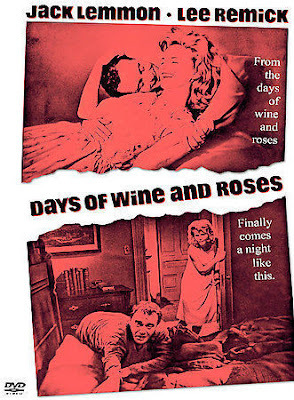
For many of us, “Days of Wineand Roses” is primarily a ballad, best known in a 1963 rendition by pop singerAndy Williams. It’s got a noble pedigree, featuring Johnny Mercer’s lyrics setto a Henry Mancini tune. Over the yearsit’s often been recorded, and has become a jazz standard. It won a Grammy for1963 Song of the Year, as well as an Oscar for its appearance in the film ofthe same name.
It’s that 1962 film I want tofocus on now, partly because it, and the Playhouse 90 teleplay thatpreceded it, have recently inspired amusical version (now running through the end of this month) that features someof Broadway’s best and brightest. The music is by Adam Guettel, with book byCraig Lucas, both of whom have impressive resumés and reputations for producingserious dramatic work. (Their prime collaboration is the musical version ofanother sensitive movie drama, The Light in the Piazza.) The female leadis the much-honored Kelli O’Hara, and her male counterpart is another Broadwayveteran, Brian d’Arcy James. The score, which does not include theMancini/Mercer ballad, is gorgeous, and I’ve heard the staging is highlyinventive. But the fact that the play was originally scheduled to run throughApril 28 suggests it has not caught fire with audiences, and I wonder how mostof us will ever manage to see it.
Days of Wine and Roses, directed by Blake Edwards from a JP Millerscreenplay, takes a close look at how lives are destroyed by alcohol abuse. Inthis it makes a fascinating contrast to the early classic of the genre, BillyWilder’s The Lost Weekend. The 1945 Wilder film, starring Ray Milland,is an unforgettable close-up look at a man who, over the course of twoharrowing days, nearly destroys his life because of his addiction to thebottle. By contrast, Days of Wine and Roses has a much larger canvas. Itunfolds over a number of years, encompassing periods of binge drinking,sobriety, and relapse. It’s also about aromantic couple, whose relationship to alcohol first enhances and then destroystheir marriage. The leads are played by Jack Lemmon and Lee Remick, both ofwhom give award-worthy performances. Both were indeed nominated for Oscars, butlost out to Gregory Peck (To Kill a Mockingbird) and Anne Bancroft (TheMiracle Worker) in a strong year. Shockingly, the film’s only win was forthat featured title song, perhaps because this was also the year of Lawrenceof Arabia, The Music Man, Sweet Bird of Youth, and The ManchurianCandidate.
What I’ve found fascinating,both then and now, is the way marriage and alcoholism are shown to be strangebedfellows. Lemmon’s character, San Francisco public relations exec Joe Clay,is a bon vivant type, one who enjoys social drinking and uses liquor tofuel his relationship with clients. When he falls for teetotaler secretaryKirsten, he makes Brandy Alexanders a central part of their exuberant courtship.Over time, both begin to depend on liquor in their domestic relationship: whenone pulls back, the other is resentful. Eventually after their cravings havetaken a toll on their professional and social lives, the marriage itselfimplodes, leaving two lost souls in its wake.
The year 1962 was a long timeago, but this film (despite its black-&-white cinematography) still feels modern.I’ve read it had a powerful long-term effect on its cast and crew, many of whomhad their own addictions to face. (Within the film, Alcoholics Anonymous is animportant presence in one character’s shaky but genuine recovery.)
March 19, 2024
Ferreting Out The Best Films I’ve Never Seen

While looking for somethingcompletely different at my local library, I came across a book I couldn’tresist. It was written by journalist Robert K. Elder, as a follow-up to his2011 volume, The Film that Changed My Life. For that book, whichgarnered respectful reviews from film geeks like Leonard Maltin, Elderinterviewed working directors about the films that had helped mold their ownaesthetic. In 2013, Elder was back witha sequel of sorts, The Best Film You’ve Never Seen. Talking mostly tothose directors he had featured in his previous book, Elder here sussed out alist of obscure films that (for whatever reason) we movie lovers should knowbetter.
Part of the fun of TheBest Film You’ve Never Seen is discovering movies about which we havelittle or no prior knowledge. The always perverse Todd Solondz (Welcome tothe Dollhouse) makes a good case for an obscure indie called TheHoneymoon Killers. And John Waters, the celebrated purveyor of deliberatelyskanky films like Pink Flamingos, argues persuasively that the ElizabethTaylor/Richard Burton misfire known as Boom! can be a source of viewerdelight. The book has also alerted me tothe dubious joys of Killer Klowns from Outer Space.
Some of the directors’ choicesare surprising. Several selected big studio productions from bygone eras. Thelate Peter Bogdanovich, who always had a passion for the stylistics of longago, endorsed a 1932 Ernst Lubitsch gem, Trouble in Paradise. I’ve seenthis frothy film about con artists and thieves, and can vouch for its charm. (Notably,it was selected in 1991 for inclusion in the National Film Registry.) I guessits age makes it obscure to most of today’s moviegoers, but what about RichardCurtis’s selection, Breaking Away? This amiable coming-of-age comedyabout bicycle racing in Bloomington, Indiana, won an Academy Award for itsSteve Tesich screenplay, and was nominated for four other Oscars, includingBest Picture. I enjoy realizing that Curtis, known for such very Englishromantic farces as Four Weddings and a Funeral and Love Actually,is enamored of Tesich and Peter Yates’ cozy slice of Americana.
It's fitting, I guess, thatBill Condon—best recalled for splashy Hollywood musicals like Chicago andDreamgirls—would endorse Bob Fosse’s first screen directorial effort, SweetCharity. But who would have guessed that Kevin Smith, the outrageous indiedirector of Clerks, would have a thing for Fred Zinnemann’s (and PaulScofield’s) 1966 Best-Picture winner, A Man for All Seasons? It seems thatSmith’s Catholic school education, and the efforts of one particular nun, havemade him passionate about Sir Thomas More’s doomed efforts to save the One TrueChurch back during the reign of Henry VIII. Smith has high praise for the filmmakingas well as the subject matter, which he expresses in very Kevin Smith fashion.Book author Elder asks the question; “You’ve said that A Man for All Seasonsis ‘porn for somebody who loves language.’ How does it differ from regular,missionary-position dialogue in other movies?” And here is Smith’s reply:“Because every line of dialogue is a close-up jizz shot to some degree or areally great close-up on double penetration.” (You can’t get much more eloquent than that.)
Reading this book has made meeager to check out some films I’ve only heard of, like Frank Perry’s TheSwimmer and Vincente Minnelli’s Some Came Running (produced in thesame year as his great triumph, Gigi). And I’ll be pondering Henry Jaglom’s takeon his friend and mentor Orson Welles’ F for Fake, which Jaglomtantalizingly calls “the most autobiographical of Orson’s films.”
March 15, 2024
Sandra Hüller Takes Off in “Toni Erdmann”
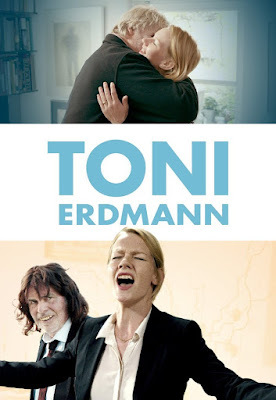
There was German actressSandra Hüller at the Oscars last weekend, looking sleek and pretty as shebeamed for the cameras. But we also saw her on-screen in film clips: as anaccused murderer cruelly deriding her late husband; as a Nazi wife purring gleefullyas she tried on someone else’s fur coat and lipstick. So what are we to make ofthis woman, formerly unknown to most American audiences? Out of curiosity, Idecided to watch the 2016 German film that first put Hüller on the world cinemamap. Toni Erdmann, written and directed by Maren Ade, won awards allover Europe, and was an Oscar nominee for foreign language feature. I knewnothing about it, but sensed it was off-beat. An English-language poster fullof review quotes contained language like this: “Wildly imaginative!” and “It’sabsolutely nuts!”
It's also long (162 minutes),and for much of the early going I debated about switching off the video. Thestory begins with a white-haired German man, Winfried Conradi, opening the doorto a delivery guy and implying that the package that’s arriving containsbomb-making materials. Winfried, who’s a divorced music teacher, likes to playbizarre practical jokes, sometimes donning a mop of a wig and a snaggly set of faketeeth to shock those around him. Hüller enters later as his grown daughterInes, a successful businesswoman visiting from her high-power job in Bucharest,Romania. She’s in town to visit relatives, but can’t be torn away from herever-present mobile phone.
The scene shifts toBucharest, where we see more of Ines’ work life. Under constant stress from aneed to please her bosses, she shoves herself daily into a business-like darksuit and very high heels, then coils her blonde hair into a tight French twistbefore setting out to make presentations to clients. She has a social life ofsorts, but it’s always being interrupted by her strong sense of obligation tobosses who don’t always seem to have her best interests in mind. It’s only in ascene with her co-worker/lover—she’s uncharacteristically wearing a short,tight dress that doesn’t flatter—that we start to discover she’s incapable oftruly feeling pleasure.
Into this tense atmospherecomes Winfried in his wig and fake teeth, introducing himself to Ines and hercolleagues as an unlikely “life coach” named Toni Erdmann. The more that Inestries to send him back to Germany, the more he pops up in her life, minglingwith those in her circle and even claiming to be the German ambassador: theytry to be polite but are clearly confused. It’s at this juncture that Ines seems to reach her breaking point. She’sbeen asked by the higher-ups to turn her birthday celebration into ateam-building exercise via a party at her comfortable flat. She’s put out aspread of fancy foods and is struggling to pull herself into a colorful frock .. . but then something in her seems to give way. I won’t spoil all thesurprises, but will merely say that after that wild and crazy sequence theaudience starts looking at Ines in an entirely different way.
By the end, we’re back inWinfried’s German home town, for the staging of an elderly relative’s funeral.Once again father and daughter come together, for an interchange that’ssurprisingly poignant. Both, I think, have changed—but Ines has clearly learnedsome key truths about herself, and we expect her future will be somehow muchdifferent from what has gone before. Brava to Sandra Hüller, who has shown usthat she contains many possibilities.
March 12, 2024
Going for the Gold: The 2024 Oscar Ceremony

For years, ever since I canremember, I’ve watched the Oscar telecast. At first it was a chance toparticipate in my parents’ world by discovering the movies that excited them. Ivividly recall how thrilled they were when the modestly-budgeted Marty beatout some schmaltzy epics like Love is a Many Splendored Thing. Anddecades later, during my father’s final illness, I remember him cheering for Schindler’sList at a time when he was much too frail to actually watch such an intensedrama. In 1968, for perhaps the first time, I’d seen all the Best Picture nominees, and felt that most ofthem (The Graduate, Bonnie and Clyde, Guess Who’s Coming toDinner, In the Heat of the Night) significantly touched on theissues that were rocking my own world. My fascination with the 1968ceremony—which gave golden statuettes to In the Heat of the Night anddirector Mike Nichols for The Graduate—led me in a highly roundabout wayto the writing of my most recent book, Seduced by Mrs. Robinson.
All and all, I’ve loved thepomp and circumstance surrounding the Oscars. Which doesn’t mean I’ve alwaysagreed with the prize-winners. And certain ceremonies, like that weirdmid-pandemic celebration held at L.A.’s Union Station (it was all set up togive its ultimate honor to the late Chadwick Boseman, but Anthony Hopkinsspoiled the party) have left me with a bad taste in my mouth. But I agree withthose pundits proclaiming this year’s event as one of the best in recent memory.First of all, the nominees were an exciting mix of supersized blockbusters, intimatedramas, and comedies that had something to say. I also appreciated theinternationalism of the nominee roster, including the fact that the fivepowerful films on the feature-length documentary list were all from countriesoutside the U.S. One of the evening’s most powerful moments came when theUkrainian director of 20 Days in Mariupol proclaimed that he wished hisfilm hadn’t needed to be made, but that in documenting the Russian invasion ofone of Ukraine’s largest cities he was obeying the precept that “cinema formsmemories and memories form history.” I appreciated,too, the carefully crafted words of Jonathan Glazer, Oscar-winner for auniquely staged Holocaust drama, The Zone of Interest, who decried boththe October 7 massacre in Israel and the deaths now dominating the news fromGaza.
It was also worth noting thatGerman-born actress Sandra Hüller was introduced to many of us via not one buttwo best picture nominees, The Zone of Interest and Anatomy of Fall. Forher performance in the latter, she was nominated for a Best Actress statuette.Though she didn’t win, she aroused my curiosity to the point where I sat downto watch an earlier Hüller-starring vehicle, Toni Erdmann, in which Isaw far more of her than I expected. The Oscars can definitely be considerededucational.
But of course an Oscarceremony wouldn’t be fun without a large dose of silliness. In that categoryI’d put the evening’s most extravagant musical number, the pink and perky “I’mJust Ken” from Barbie. I’d also include some pretty hilarious gowns, soextravagantly poufy that woe to anyone sitting next to the wearer of one ofthem. (Paul Giamatti, though, didn’t seem to mind.) Also in the silly category,the very undraped, very muscle-bound John Cena presenting the statuette forBest Costume Design. And, too, something I only THOUGHT was a gag, a socialmedia post from a certain former U.S. President lambasting Jimmy Kimmel’shosting gig. Yes, it really happened.
March 8, 2024
“The Wonderful Story of Henry Sugar . . . and Wes Anderson”
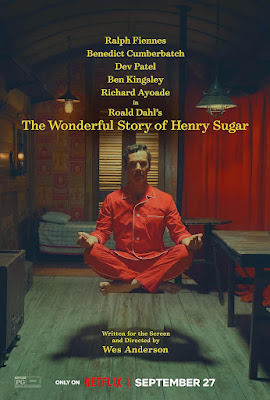
I seem to be having a bit ofa private Wes Anderson festival lately. Some cinematic research led me tore-watch Moonrise Kingdom, The French Dispatch, and his latest, AsteroidCity. As always, I was charmed by Anderson’s enchanting visuals, and by hisuse of some of the world’s best actors in quirky and unexpected ways. And yet Icould never shake the notion that most of Anderson’s work is much ado aboutnothing: that he lacks the story sense to make something that actually hasmeaning. With Oscar night coming up so soon, it’s appropriate to mention thatAnderson’s films have never lacked for Academy love. Over the years, there havebeen 16 nominations in various categories, most of them technical. The Grand Budapest Hotel (2014—perhapsthe Anderson work with the most to say) actually collected 9 nominations,including Best Picture, Best Director, and Best Original Screenplay. And it wonstatuettes for its costume design, hair and makeup, production design, andoriginal score. Still, the big prizes have eluded Anderson himself, maybebecause many Academy voters see Anderson’s works as charming stunts, ratherthan as truly meaningful creations.
Perhaps this will be the yearwhen Anderson finally wins his own Oscar. He’s on the short list not forAsteroid City (which got shut out of all categories) but for hisforty-minute adaptation of a Roald Dahl tale, “The Wonderful Story of HenrySugar.” Dah’s whimsical though sometimes macabre way of looking at the worldseems to beautifully suit Anderson’s stylistics, allowing him to romp visuallywhile giving some spine to his storytelling. Clearly Anderson is on a RoaldDahl kick: for Netflix he has applied his cinematic skills to a whole 1976 volume of Dahl stories, of which“Henry Sugar” is the first and best.
For “Henry Sugar,” Andersonenjoys the services of some of England’s finest, including Benedict Cumberbatch(as the title character), along with Dev Patel, Ben Kingsley, and (playing aversion of Dahl himself) Ralph Fiennes. All seem to have been directed to playstraight to the camera, delivering their lines at a speedy deadpan clip asthough they were reading straight from the Dahl text. And what a text it is,comprising an exotic tale within a tale. Fiennes as Dahl introduces us toHenry, a wealthy Englishman whose only goal is increasing his substantialfortune by playing cards for money. In his countryman’s well-furnished libraryhe happens upon the account of an Indian mystic who learned after years ofstrenuous concentration to read with his eyes securely bandaged. To Henry, theknowledge of this possibility leads immediately to thoughts of how he can besthis card-playing cronies by being able to read the cards in a deck though onlyseeing their backsides. He applies himself to this effort, and succeedsmagnificently, coming away with a brick-sized packet of cold, hard cash. But ofcourse things don’t work out as planned, and Dahl’s neat twist of an endingshows us the surprising ways that greed can work on the human psyche.
Dahl has supplied the storyline: Anderson contributes his own magic, mostly of the visual variety. Hislocations—whether they represent Dahl’s cozy writing cottage, a baronialstately home, an Indian guru’s jungle hut, or a hospital lounge—all seem asartificial as stage sets, and they come apart and re-form (with the help, attimes, of stagehands) with dazzling speed. What Anderson has achieved is ashort film that gives us the immediacy, and the aesthetic pleasure, of livetheatre. Which makes me wonder: why doesn’t Anderson give stage work atry?
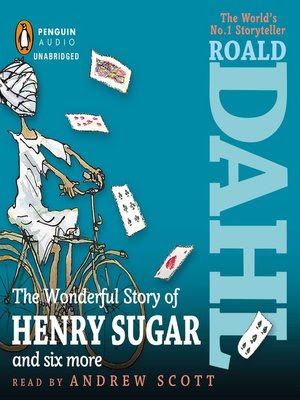
March 5, 2024
Film Geeks Cheer for LAist’s Film Week Extravaganza
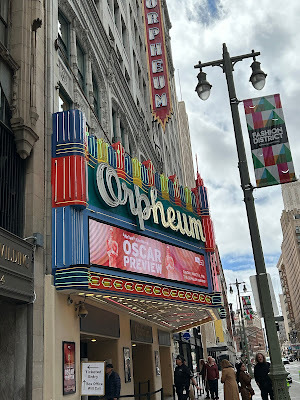
Over the weekend, I attendedwhat has become an annual bash beloved by many Angeleno film geeks. For 22years, Larry Mantle—the on-air voice of hugely popular public radio stationLAist 91.3—has hosted an Academy Awards preview show, on which all eleven ofthe station’s regular “Film Week” critics give their candid opinions about therace for Oscar gold. The show is taped for broadcasting later this week, butin-person audiences also enjoy watching film clips and applauding loudly fortheir own favorites.
This is the second year thatthe show was staged at the Orpheum Theatre, on Downtown L.A.’s historicBroadway. The street is lined with old movie palaces, many of which have beenconverted over time into churches, clothing emporia, and Apple stores. TheOrpheum, originally a vaudeville house (from 1926) with a Mighty Wurlitzer pipeorgan, has played host to such stars as Will Rogers, Ella Fitzgerald, the MarxBrothers, and Judy Garland (as one of the singing Gumm sisters). It has alsoplayed a version of itself in movies like The Artist, A Mighty Wind, BartonFink, and The Doors.
This past Sunday, on theOrpheum stage, critics of various ages and outlooks vied with each other tomake colorful pronouncements. One described the Best Supporting Actor racebetween Robert Downey Jr. (for Oppenheimer) and Mark Ruffalo (PoorThings) as Iron Man vs. The Hulk. Another, bringing up a particularlyoutrageous European film called Mad Heidi, opined, “It makes PoorThings look like On Golden Pond.” At times, the panelists seemed tobe competing for the title of Most Curmudgeonly. One snarky older man, the onlyone who took the stage wearing a jacket and tie, avowed that only four of theBest Picture nominees deserved to be on the list. And yet a critic praising Celia Song’s PastLives quoted with admiration a line from the romantic film—“I didn’t knowthat liking your husband would hurt this much”—and explained that it had movedher to tears.
It was fascinating to seewhich films got the most love from critics and audience members. This groupwas partial to witty flicks like American Fiction but also to those thatare sensitive (Past Lives) or tough-minded (The Zone of Interest).Front-runner Oppenheimer garnered much enthusiasm, but Barbie toohad her fans. Not so Killers of the Flower Moon or Maestro: Iliked both these films a great deal, but seem to be in the minority. In somecases the discussion made me want to watch a film again: such is the case withthe complex whodunit, Anatomy of a Fall. There was also much criticalappreciation for a movie that didn’t rack up a single nomination, the Britishentry, All of Us Strangers.
At the close of the show,audience members were able to ask questions of the panel. I often cringe whenquestioners use their spot at the microphone to show off their own smarts, butthe questions asked at this event were pertinent, and elicited intelligentanswers. Someone wanted to compare the Oscar chances of the sound designersbehind the films Oppenheimer and The Zone of Interest, in both ofwhich the audio track plays a key role. Another man questioned the public’sdeclining interest in the annual Oscar broadcast. I didn’t ask a question, butbelatedly wished I had. Several of the Robert Downey fans on the panel said hewas “due” for an Oscar, after years of strong work. Here’s my question: shouldOscars winners be chosen for one outstanding performance or for the legacy of anentire career?

Beverly in Movieland
- Beverly Gray's profile
- 10 followers



